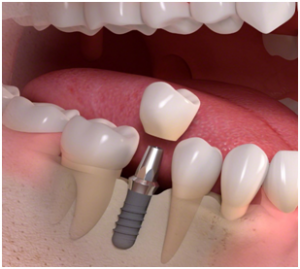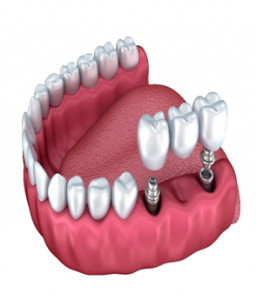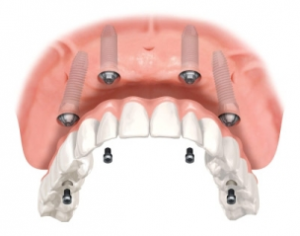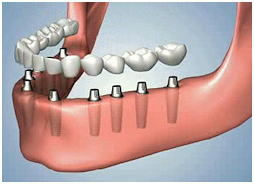What are Dental Implants?
Dental implants, Made of Titanium, are artificial tooth replacements used to counter tooth loss. The conventional dental implant is an artificial tooth root that is placed into your jaw to hold a replacement tooth or bridge.
Dental Implantology is considered to be one of the greatest advancements in dentistry since they truly are “the next best thing to your natural teeth.” Once it integrate with the jawbone, the crown, bridge or denture is then attached to the implants. This provides much greater stability for more effective eating, speaking and smiling! The procedure is categorized as a form of prosthetic (artificial replacement) dentistry, though it also falls into the category of cosmetic dentistry as well.
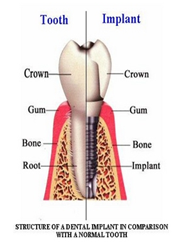
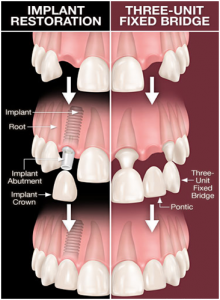
Dental implants are an ideal option for people in good general oral health who have lost a tooth or teeth due to periodontal disease, an injury, or some other reason. They look and feel very natural such that you may even forget about your loss of tooth/teeth. If you have one or more teeth missing and wish to eat your favorite foods, increase your chewing ability, and improve your appearance, speech, and self-esteem, then you are a candidate for dental implants.
These high-tech prostheses are actually more tooth saving than traditional bridgework, since implants do not rely on neighboring teeth for support. So no need to cut or custom near tooth.
As per the available scientific evidence, natural teeth absorb great amount of biting pressure – approximately 540 lbs/sq. inch. On the contrary, those who are wearing dentures can hardly absorb more than 10 per cent of this pressure. However, dental implants can withstand 450 lbs./sq. inch biting pressure without any problems, whatsoever.
A wide variety of dental implant designs are available and the choice of dental implants are based on various factors such as the bone quality, quantity, proximity to the adjacent anatomical structures such as the maxillary sinus, dental nerves and blood vessels, general medical status of the patient, history of habits such as smoking and pan chewing etc.
How do Dental Implants Works…?
Once implant placed in jawbone it will start to integrate with the bone, as it is biocompatible material it will fuse bone. Because implants fuse to your jawbone, they provide stable support for artificial teeth. Dentures and bridges mounted to implants won’t slip or shift in your mouth — an especially important benefit when eating and speaking. This secure fit helps the dentures and bridges — as well as individual crowns placed over implants — feel more natural than conventional bridges or dentures.
Are you a candidate for dental implant?
Generally all the edentulous patient/ no teeth or single tooth loss patients are candidate for dental implant.
-
Single tooth replacement
Immediately (at the same time an implant is placed) or after a period of healing, an abutment is attached to the implant. The custom crown is cemented or screwed onto the abutment to permanently keep it in place. Once the crown is in place, it should be indistinguishable from your natural teeth
-
Multiple teeth replacement
As like single tooth replacement, one can restore his/ her multiple teeth. The procedure for the replacement remains same. After healing of implants, abutment placed over implants and the teeth
-
Implant Supported Denture
If all of your lower teeth are missing, depending on the design of the removable restoration, two to six implants may be used to support a lower denture. If all of your upper teeth are missing, a minimum of four implants may be used to support an upper denture. Removable dentures are often used to replace extensive tooth, bone and gum-tissue loss, thus providing support for the facial skeleton, lip and cheeks. A new denture can have attachments that snap or clip it into place on the implants or a custom made, milled bar can be fabricated to create additional strength and support for the restoration.
-
Full Mouth Rehabilitation.
As like above options one can go with Full mouth fixed teeth/ Implants. It will require six/ seven/ eight implants for mandible jaw and maxillary jaw. Once healing completed then same procedure apply for fabrication of the.
WHY DO I NEED A SINUS LIFT PROCEDURE?
A Sinus Lift is often required as a first step when placing a dental implant in the back of your upper jaw. When upper back teeth are lost, bone in that area naturally shrinks or resorbs over time. Consequently, your sinuses expand to occupy the empty space where the bone used to be. Because there is insufficient bone available to securely place the dental implant, the sinuses must be lifted in order to create space for placing additional bone in that area.
What type of maintenance do dental implants require?
Implant crowns and other prosthetic (false) tooth replacements are made to be remarkably failsafe systems. They are removable and replaceable (only by your dentist), so that if damage or wear necessitates replacement, this can be accomplished without affecting the implant(s) or attachment to the bone.
Nevertheless, implants do require maintenance. It is important to practice good daily oral hygiene, including brushing and flossing to control bacterial biofilm. It is also important to see your dentist and dental hygienist. Special instruments are necessary to clean dental implants that will not damage their metal surface beneath the gum tissues. Your dentist will need to monitor your implants to make sure the integrity of the osseointegration is stable, and that the implant crowns, bridgework or dentures are functioning adequately.

